Interview with director Hiroyuki Imaishi & Kazuki Nakashima, who are close to 'the pleasures they are looking for' and have a high synchronization rate, about the original new theater animation 'Promare'

The original theatrical animation 'Promare' sent by the director Hiroyuki Imaishi and the scriptwriter Kazuki Nakashima, who are known for 'Tengen Toppa Gurren Lagann' and 'Kill la Kill '. The hot battle between the flame-manipulating race 'Burnish' and the high-mobility life-saving fire brigade 'Burning Rescue' against Burnish is depicted.
I had the opportunity to talk directly to Director Imaishi and Mr. Nakajima about how this work was created and what they are particular about, so I asked them questions.
Movie 'Promare' official website
Movie 'Promare' 2nd PV production: TRIGGER (released nationwide in May) --YouTube
GIGAZINE (G):
This time, when I heard the story, I read the script and storyboard of the work in advance, but it was not concretely drawn who drew where in the storyboard. Is this because Director Imaishi is in charge of the A part?
Hiroyuki Imaishi, director of 'Promare' (hereinafter referred to as 'Imaishi'):
I think all the A parts are drawn by me.
G:
It feels like I'm not sure if I'm drawing and I'm sick of it, or what's being drawn as I go to the second half ...
Imaishi:
It's almost always like that (laughs)
G:
Did you draw this in order from the beginning of Part A?
Imaishi:
This time I drew an irregular way. Once, I drew the rough conte through to the end, made a temporary dubbing roll based on it, verified that 'Let's expand here, let's scrape here', and then made a clean copy. That was about a year or two ago, but the pictures I drew at that time sometimes remain (laughs). Some of them are clean-up and some are fluffy.
'Promare' script, Kazuki Nakashima (hereinafter referred to as Nakashima) :
Actually, the scenario had already been raised at the time of the rough contest, but after the rough contest was completed, I consulted with 'What should I do?' rice field.
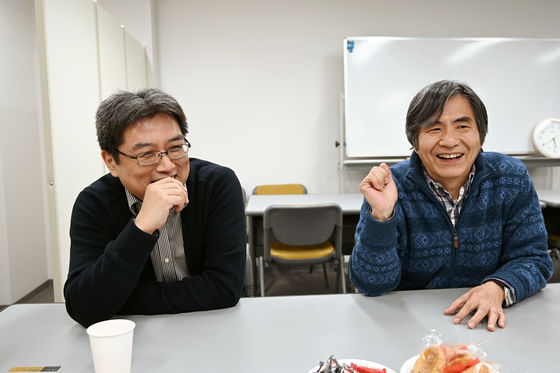
G:
Well, writing the script first doesn't mean it's over.
Nakajima:
Rather, the lines are always messed up to the last minute.
G:
How did you decide who would draw which part of the storyboard?
Imaishi:
Since I drew the rough, there was a groundwork, but I didn't have enough time to clean up the cleanup and put together the changes so that the animator could make a cut, so I asked people who were accustomed to knowing what to do to help me. That's why my president, Otsuka, also summarizes the storyboards.
G:
So that's it. Looking at the storyboards, I thought that the design would change from time to time.
Imaishi:
It will change. It's quite anomalous.
G:
Which of the two did you decide to talk about 'Promare' this time?

Nakajima:
'Flame' is from me. 'Let's make it a living flame,' he said quite early on. 'Next to living clothes is living flames' (laughs)
G:
That was the case (laughs)
Nakajima:
Reading Ted Chiang's
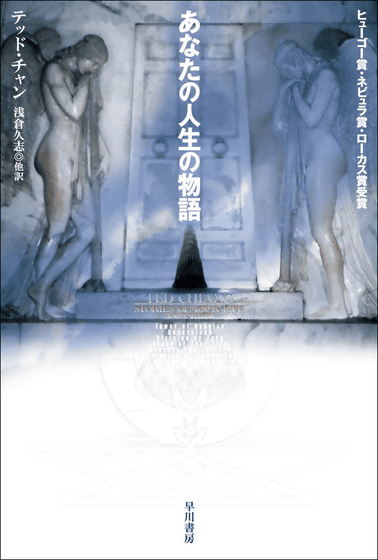
G:
So that's it.
Imaishi:
I think it's 'where to look for pleasure'. I think the types of pleasures we are looking for are close.
Nakajima:
In short, what do you find interesting? Even if we don't explain too much to each other, we can sensuously share 'this is interesting,' and the story is quick. For example, when you say 'I think meat is delicious', people who like vegetables and have never eaten meat will say 'I don't know if such hard food is delicious?' But if you like meat, you can just say 'Yeah, meat is good'. That's what it is.
Imaishi:
'Dare, I like hard meat, isn't it?'
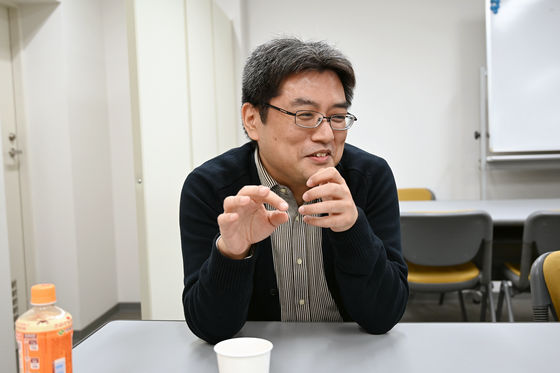
G:
What did you do well in that part of this 'Promea'?
Nakajima:
Rather, I had a hard time this time.
G:
Did you 'difficult' even though they were such two people?
Nakajima:
It was really hard to get here. As usual, this person breaks when my script comes to the final draft. It's only 'Tengen Toppa Gurren Lagann' and 'Kill la Kill', and if you think you've done about 1 or 2 episodes, break it!
G:
Break! (smile)
Nakajima:
'It's not this!' (Laughs) First of all, there is 'It's not this!' So, this time, I tried to break it out, saying, 'This isn't it!'
(Everyone laughs)
Nakajima:
Then, 'This isn't it!'
G:
Furthermore (laughs)
Nakajima:
I had a lot of things like that, so I had a hard time. It's the third work in a tag team, and the first theatrical work, so I thought 'I want to do something that I have never done before', but on the other hand, I thought about how to bring out my own personality, and when I tried to do something I did not do, 'We It's not like that, isn't it? '... This time, I was worried about where to put our motivation.
G:
What was the reason why Director Imaishi even broke 'this is not the case'? What didn't you like?
Imaishi:
Hmm ...?
Nakajima:
I remember the one who was torn, but I forgot the one who was torn!
(Everyone laughs)
Nakajima:
The reason was that the setting of the main character was too complicated and it was a little 'far' to fit in 2 hours. If I don't make it simpler, I think I can't do what I want to do in two hours. So I thought about a direction I hadn't done before, but that wasn't the case. Because there are times when you can understand it by making it to some extent. I think that means ...
G:
Is this Mr. Nakajima's expectation roughly correct?
Imaishi:
From my point of view, Mr. Nakajima's head rotation speed is unusually fast, and things go five or six times faster than I do. That's why it comes into shape before I come to a conclusion. It's amazing in itself, and there are some products with a considerable quality that 'normally you can do it as it is', but you can make a calm judgment because of its concrete shape. However, if this comes up at the timing of 'I have to start drawing from tomorrow', I have no choice but to go as it is.
Nakajima:
That's why I thought. 'In order not to fix it, I have to put it out to the last minute!'
(Everyone laughs)
Imaishi:
That's the means that animators do, and if you raise it to the limit, the animation director will not be able to fix it.
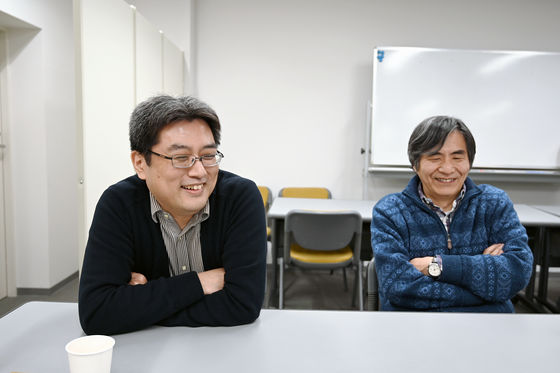
(Everyone laughs)
G:
Similarly, when
Imaishi:
No, I'm not approaching at all.
Nakajima:
Is that still the ideal director image?
Imaishi:
That being said ... This is the first time I've made an original movie from start to finish, and the order of work and the points of competition are completely different from TV, so I knew it in my head, but I couldn't do it at all. There was something like that ... You don't want to hear such a story before you watch the movie.
Nakajima:
That's why the film is so good!
(Everyone laughs)
G:
Director Imaishi used to distribute doujinshi at the committee. That is a collection of works that I drew when I was in college.
Imaishi:
Some of them have been redrawn after graduation, but most of them are from my student days.
G:
I was surprised that this manga was very good, but why didn't you become a manga artist?
Imaishi:
Rather, I drew that and thought, 'I can't be a manga artist.' There is no 'story' and 'theme'.
Nakajima:
Oh, it's the pleasure of painting.
Imaishi:
I have the pleasures of 'picture' and 'directing', and I have 'this is what happened, it's interesting', but there aren't many 'what I want to say'. There is no such thing as 'what it means', only 'fun as entertainment'. When I was in college, I majored in video at art school, so I came up with something based on the theme, but when I actually made it from the theme, it tended to be sober. When I started drawing, it became 'fun just to draw this cool picture', and I couldn't even think about the theme and stopped. I realized it.
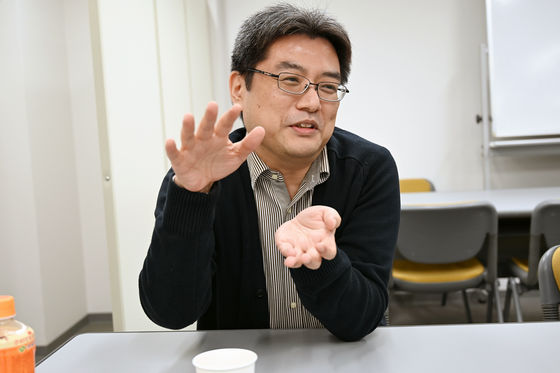
Nakajima:
But it's amazing to be able to judge that when I was a student.
G:
That's true.
Imaishi:
It's hard to become an animator from a manga artist, but I thought that the possibility of becoming an animator from an animator is sweet because there are many precedents.
Nakajima:
Hayao Miyazaki also draws 'Nausicaa of the Valley of the Wind'.
Imaishi:
Yes, on the contrary, it must be as great as Katsuhiro Otomo.
Nakajima:
No, I'm Osamu Tezuka.
Imaishi:
Mr. Tezuka! Isn't that impossible! (smile)
(Everyone laughs)
G:
Next, I would like to talk to Mr. Nakajima, but there is no sense of incongruity when reading as characters in the script or scenario, but there are cases where reading aloud makes me feel uncomfortable. .. In the case of Mr. Nakajima's script, including this 'Promare', when you read it aloud, it sounds smooth without any discomfort. Is this something you are aware of? Or is it possible to write in this way naturally because I am working on theater?
Nakajima:
This is because I've been writing what people play aloud for 40 years. I play it in my head and write it with a pleasant rhythm.
G:
It's a rhythm.
Nakajima:
Yes, I write in rhythm and sound, not in letters.
G:
When I read it in letters, I thought, 'Why is this line?', But when I said it aloud, there was something that was refreshing, 'I see.' I saw that you started writing theater when you were in high school, but did you start writing with rhythm in mind?
Nakajima:
Well, I wrote with my own comfortable rhythm.
G:
Nakajima:
What I always do is that if I translate what I'm talking about in English, I'll change the maxim to something Japanese, so a person with a katakana name says, 'If you don't ring the dragon, you won't be hit.' Even if it does, it does not mean that the person himself knows the maxim and says that it is replaced by the fact that it would be appropriate if it were replaced with Japanese, and he said that he would make a theory within himself. That is. Think in light of the rules you have created. If you want to do a historical drama with 'Shinkansen', you should avoid the 'Saboru' mentioned earlier, but if the content is closer to gag, it may be an ant. Even if the writer thinks hard, it's over if the actor puts in katakana in ad lib, so I feel like I'm fighting with some kind of resignation.
G:
Also in the serial column, about the writing schedule after becoming a full-time screenwriter, ' I used to go to work in the daytime and write manuscripts at night, so I tend to stay up late and go to bed at about 5 am. I woke up from 10 am to 11 am and went to work. When I quit the company, I was thinking of getting up a little earlier, but I just worked at the pace I used to and went to bed. It will be around 5 to 6 o'clock. Naturally, it will happen around noon. ' Is it still the same time schedule?
Nakajima:
Now it's a little earlier, I sleep at 2 to 3 o'clock and get up around 9 to 10 o'clock.
G:
You said that you will meet the deadline considerably, but is there anything special you are doing to meet it?
Nakajima:
This is a personality, and I'm just 'keeping the deadline so I don't die.' When I break the deadline, I come to my stomach thinking that it caused trouble to the people around me. That's why I'm keeping the deadline because it's better to meet the deadline if I feel awkward. Because I'm crushed.
G:
I was wondering why I wrote so much because it was written here and there that I had to meet the deadline.
Nakajima:
When I'm sleeping, I only see the content that 'I can't go unless I go somewhere, but I'm having trouble and I can't reach it.'
Imaishi:
That's exactly the opposite of me. Because the deadline is rather broken ... I'm getting heavier year by year, and I'm repeating the same mistakes over and over again.
Nakajima:
After all, I am important, so it is a story of how to live to take care of myself. There are two patterns of editorial writers, 'I've had such a terrible experience, so I'll make you more terrible' and 'I know the circumstances, and behind you. There are a lot of people waiting for you. OK, I'll keep the deadline properly. ' I am the latter.
G:
Mr. Nakajima had been wearing two pairs of straw shoes, an editor and a screenwriter, for 28 years before he quit the magazine. Why was it possible to achieve both for such a long period of time?
Nakajima:
People can only walk on two legs.
(Everyone laughs)
G:
I say good things!
Nakajima:
There is nothing inside, but it makes me think 'Is that so?' (Laughs) I wanted to do both. I wanted to be an editor since I was in junior high school, and I met theater when I was in high school, so my dream of becoming an editor came first. The work at the company was also interesting, and I was able to do what I wanted to do. On top of that, acting is a hobby. It was time for me to write a script for everyone to play mahjong, drink alcohol, ballroom dance, and climb mountains.
G:
That's why I was able to continue. Finally, do you have a message for the release of 'Promare'?
Imaishi:
This time, we are making a straight action movie for all ages, so I hope you enjoy it with confidence.
Nakajima:
It's a work that feels good to look at for all ages, but it has a sharp edge, and for those who like this kind of thing, there are hidden tastes in various places and hooks are made. I think that it is the total settlement of ourselves and also the work of the 'decisive battle' that will make a new start, so I hope you enjoy it.
G:
Thank you for today.
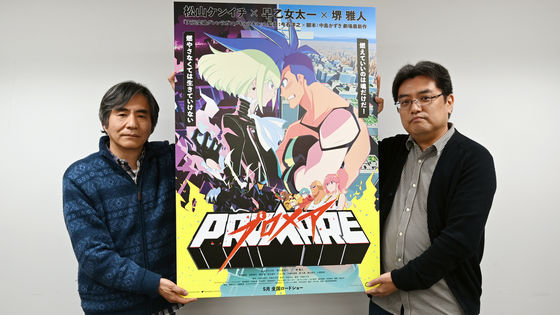
Please look forward to the release of 'Promare' to see what kind of original theater work this tag produced.

In June 2019, we interviewed Director Imaishi and Mr. Nakajima again when the work was released. If you read and compare, you may find one side that will be the answer.

Movie 'Promare' book notice Produced by: TRIGGER May 24 <Fri> National release --YouTube
©TRIGGER・中島かずき/XFLAG
Related Posts:






